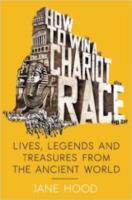
Icon Books (2015) p/b 224pp £8.99 (ISBN9781848319462)
A miscellany, a pot-pourri, a lanx satura, a ποίκιλμα, a romp through the classical world, with something for everyone from an enthusiastic Year 10 Latin student to the Ladies Who Lunch in my book club. It has been written with humour and covers snapshots of the literature, history, culture, mythology and philosophy of the classical Greeks and Romans. It entertains and entices the reader and is based on some sound research and reliable sources. You can dip into whichever section takes your fancy or read from cover to cover. It is easy to navigate with an excellent contents page, and encourages discussion and further investigation, made possible by the respectable bibliography.
The wide range of subject matter explored brings home to the general reader what makes any study of the classics fun, and how much we have in common with the ancient world. Highlights for me included how Milo died, how to cook an ostrich (don’t try this at home), how to make a spell (don’t try this one either), the bald man paradox, how to recycle a wax tablet, ancient public libraries, and what constitutes true friendship. The book offers topical advice: si pacem vis, bellum para (‘if it’s peace you want, prepare for war’). Be inspired to go and look at the Parthenon sculptures and the Rosetta stone, visit the Antikythera mechanism, (the world’s first computer) in Athens, dust off your copy of Keats, Aristotle or the Bible. Find out why it was difficult to read Latin: ITREALLYISNTTHATDIFFICULT. Test yourself at the end of every chapter with the ‘short written tests’, which include some provocative questions (p. 89: what was the blood of gladiators used for?).
H. succeeds in her aim of counteracting the ‘tweed-wearing old school teacher, who gave classics a very bad name’—if he still exists (p. 3)—by making the subject accessible and appealing to the general reader. The Romans may not have had iPhones (though we all know that Caecilius had a tablet), but H. shows that they were a lot like us. Light-hearted and quickly readable, this book is a marvel to be bought and shared, and I have already recommended it to several people with an interest in the classical world. Perhaps it is not a possession for ever, however, and I am still not sure I know how to win that chariot race.
Alison Henshaw—Nottingham High School for Girls
